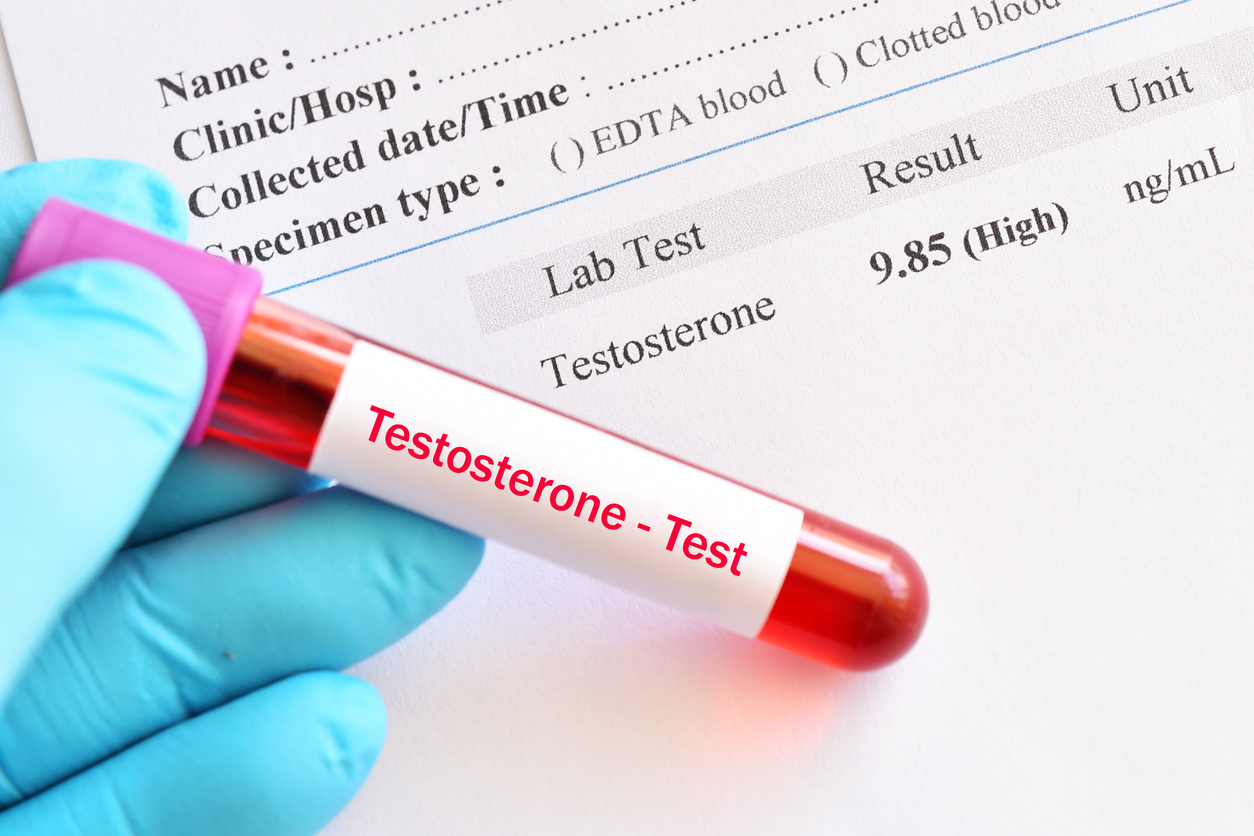

It is believed that increased levels of insulin in the body cause the ovaries to work differently, which then produces excessive levels of testosterone (androgens), which in turn causes many of the symptoms of PCOS.
Although all women produce a few androgens, elevated levels of androgens are linked to symptoms such as excess facial/body hair, acne and scalp hair loss. It also affects the period and ovulation cycle.
Start PCOS Treatment Free Nutrition GuideAndrogens are a group of sex hormones that help start puberty and play a role in reproductive health and body development. Testosterone is the most common androgen.
Testosterone is the major sex hormone in males and plays several important roles, such as regulating sex drive (libido), bone mass, fat distribution, muscle mass and strength. It also helps with the production of red blood cells and sperm.
However, testosterone is not only important in men, it is equally important in women too. Testosterone is produced in the ovaries and adrenal glands. It's one of several androgens in females.
Natural testosterone is a steroid — an anabolic-androgenic steroid. "Anabolic" refers to muscle building, and "androgenic" refers to increased male sex characteristics.
However, when you hear people use the term “anabolic steroids” they are generally referring to synthetic (made in a lab) variations of testosterone that are injected into your body. The anabolic steroids used by athletes are often forms of testosterone made in a lab. Some people use anabolic steroids for medical reasons. But doping for sports isn't one of the uses the drugs are approved for.
Testosterone is thought to have important effects on ovarian function, bone strength and sexual behavior, including normal libido. The proper balance between testosterone (along with other androgens) and estrogen is important for the ovaries to work normally.
All women have testosterone in their bodies. There are two methods to measure testosterone levels:
Total testosterone refers to the total amount of all testosterone, including the free testosterone, in your body. The range for this is 6.0-86 ng/dl.
Free testosterone refers to the amount of testosterone that is unbound and active in your body. This amount usually ranges from 0.7-3.6 pg/ml.
Women with PCOS often have an increased level of both total testosterone and free testosterone. Furthermore, even a slight increase in testosterone in a woman’s body can suppress normal menstruation and ovulation.
Causes of low testosterone levels:
Causes of high testosterone levels:
When it comes to trying to get pregnant, for women, high testosterone is more commonly a problem than too low testosterone. Testosterone is just one of several hormones known as androgens. High androgen levels in women are known as hyperandrogenism.
Women with low testosterone levels may experience:
Low testosterone in women is usually seen during menopause, though it can occur at any age. Testosterone levels decrease along with estrogen and other reproductive hormones. Low testosterone is not usually a problem in women trying to conceive.
High androgen levels or hyperandrogenism is a classical feature of PCOS and forms one of the diagnostic criteria for PCOS. Depending on the level of androgen in the body, high levels of androgens can show up as:
The only way to know your testosterone level is with a blood test. A testosterone test measures your levels of the hormone testosterone - free and total.
You may talk to your doctor about a testosterone level test if you have symptoms of high testosterone. Most people don’t need to do anything special to prepare for a testosterone test.
In women, levels of testosterone can be lowered with a combination of lifestyle modifications and medications. Eating a balanced diet, exercising regularly and managing stress and sleep cycles can help in treating the underlying hormonal imbalance in the levels of testosterone. Depending on the severity of your symptoms, your doctor can also recommend medications.
Oral contraceptive pills (OCPs) can help improve symptoms of high androgens. This help reduces the amount of androgen in your body which brings down these symptoms. Anti-androgen drugs, such as spironolactone are also available for use in more severe cases of hyperandrogenism. They should only be considered if lifestyle changes and 6–12 months of using oral contraceptive pills haven’t worked for you. Since anti-androgen drugs can cause birth defects in unborn children, women are always given a birth control pill to avoid the risk of pregnancy while taking anti-androgens.
Recent research has shown that spearmint may be used as a treatment for mild hirsutism in women. Its antiandrogenic properties may help reduce the level of free testosterone in the blood which can help manage hirsutism better. However, the research on using spearmint for hirsutism is limited and more robust studies are required before any conclusions can be made regarding its effectiveness.
Here are some of the frequently asked questions about testosterone and its use:
Note that testosterone does not trigger weight gain, but instead is an accessory symptom. In PCOS, high levels of insulin and androgen can contribute to weight gain.
Ashwagandha is primarily used as an adaptogen, meaning it helps your body handle stress and anxiety. However, a limited number of studies have also shown that ashwagandha helps increase testosterone levels in both men and women.
Research shows that the hormone testosterone may improve sexual function in specific groups of women, but data on safety and effectiveness are limited. The long-term safety of testosterone therapy for women is also unknown. Testosterone therapy might help if you are postmenopausal, taking estrogen therapy and have a decreased sex drive with no other identifiable causes
Testosterone is an important hormone in both men and women and is involved in a lot of main processes. Any imbalance in the levels of testosterone can affect the optimal functioning of the body. Especially in women, high levels of androgens are a classical feature seen in PCOS that can cause many symptoms including hirsutism (excess facial/body hair), scalp hair loss and acne. If you suspect having high levels of androgens, speak to our experts at Veera Health for personalised treatment.